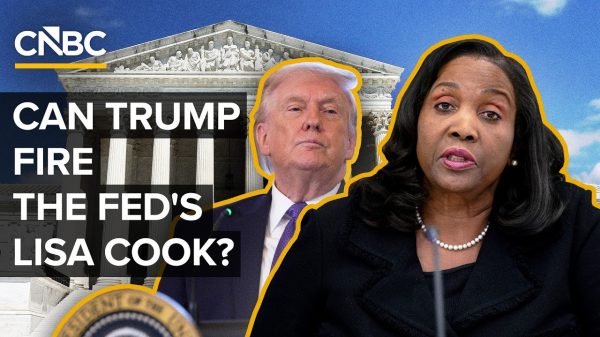The Hamas attacks on Israel could trigger a repeat of what happened to the global economy in the 1970s.
In central banking lore, the 70s are a formative decade. It’s the classic example of inflation getting out of hand before monetary policy wrestled back control in the early 1980s.
Are we repeating history? The similarities are striking. In both decades, inflation sped up dramatically when there was an energy shock. Then it came down steadily for some time.
It’s easy to forget that inflation looked nearly beaten in 1976. The problem was a new crisis in the Middle East that sparked a whole new burst of price gains. That led to the dreaded stagflation—high inflation coupled with weak growth, a tough cycle to break out of.
In August, former Treasury Secretary Larry Summers started a social media storm by posting a graph showing the parallels of inflation now and in the 70s. It implied that, if the relationship holds, inflation was about to take off again. The main objection to that point was there was unlikely to be another geopolitical energy crisis this time around.
Sadly, the Hamas attack on Israel may be just that. It’s not clear yet how oil prices will be affected, but another spike in prices is a clear possibility.
There are still big differences between now and the 70s. The biggest is that the global economy is much less reliant on oil for growth. That’s one reason why Federal Reserve officials speaking Monday suggested interest rates don’t need to go higher soon.
Another difference is that, despite the auto workers and Hollywood strikes, wages are probably more flexible now because unions have lost power. And central banks are eager to show the lessons of the 1970s have been learned.
It’s mostly likely that the 2020s will create new historical teachings. But the shadow of the 1970s is looming large.
—Brian Swint
*** Join MarketWatch reporter Joy Wiltermuth and Sheila Bair, former FDIC chair, today at noon when they talk about why financial ruin lurks when easy-money ways and speculators lead to “useless innovations,” “moonshots” and other “dumb things.” Sign up here.
***
Assessing the Next Rates Move After Yields Surge, War Erupts
Federal Reserve officials hinted that the central bank may choose not to raise interest rates in November. Dallas Fed President Lorie Logan said the recent surge in long-term bond yields may mean less of a need to do so, while Fed Vice Chair Philip Jefferson said officials can “proceed carefully.”
- Futures traders see an 88% probability of a pause in November, and a 12% probability of a quarter-point increase, according to the CME FedWatch Tool. For December, the probabilities are 74% in favor of a pause and 24% for an increase.
- Jefferson told a gathering in Dallas that after raising the federal funds rate to around 5.25% from nearly zero in early 2022, the policy makers were in a position to be cautious in assessing the extent of any additional “firming” that may be necessary.
- The Israel-Hamas war could lead to a resurgence of inflation from higher oil prices. Deutsche Bank macro strategist Henry Allen and research analyst Cassidy Ainsworth-Grace warned of the risk of a 1970’s-style stagflation, a mix of inflation and slower growth.
- While the futures market sees less of a chance of another rate increase this year, greater demand for 10- and 30-year Treasury futures boosted the possibility that those corresponding yields could slip Tuesday, MarketWatch reported.
What’s Next: The Fed’s September economic projections implied there would be one more rate hike by year-end and policy makers’ expectations that inflation would head toward 2% through 2026 and over the longer term. The minutes of that September meeting come out Wednesday.
—Liz Moyer
***
Defense, Airline Stocks React to Conflict in Middle East
Stocks in the S&P 500 reacted to the weekend attack on Israel by Hamas by heading lower initially and then reversed losses to close higher for the day. Shares of energy, defense contractors, airlines, and Israel-based firms were among the movers, but investors are also keeping an eye on this week’s inflation data.
-
Defense contractors
Lockheed Martin
gained 8.9%, and
Northrop Grumman
rose 11.4%, after Israel declared war and launched retaliatory strikes in response to Hamas’ assaults by land, air, and sea on Saturday. -
Delta Air Lines,
American Airlines,
and
United Airlines
stocks all shed more than 4% after flights were halted to and from Israel. Oil prices surged more than 4%, sparking fears of higher jet fuel prices ahead. -
Shares of Tel Aviv-based
Check Point Software Technologies
slipped 1.5%. Roughly 60% of its office space and 42% of its employees were in Israel as of last year, giving it among the most meaningful exposure to the country, according to J.P. Morgan analyst Brian Essex. -
Retail gasoline prices should continue their recent downward trajectory, said Patrick De Haan, head of petroleum analysis at GasBuddy. Average prices are at $3.70 a gallon, down 11 cents in the past week.
Exxon Mobil
and
Chevron
stocks both rose.
What’s Next: A lasting impact on oil prices is probably going to be modest, ING analyst Warren Patterson wrote. If the conflict remains within Israel, price changes will stay muted, as Israel is a marginal oil producer. “Recent developments will have little direct impact on oil supply,” he said.
—Janet H. Cho
***
McCarthy Says He’s Open to Comeback as House Speaker
House Republicans are preparing to meet today and Wednesday as they select a nominee for the vacated speaker’s office, and a familiar name has suddenly come up as a possible candidate. Former Speaker Kevin McCarthy, ousted just last week, suggested he was willing to take the gavel again.
- McCarthy, who didn’t officially toss his name in the ring, nevertheless didn’t rule it out as he did last week. He would go up against House Judiciary Chair Jim Jordan and Majority Leader Steve Scalise, who are both officially seeking the office. McCarthy wouldn’t endorse them on Monday.
- The California Republican told radio show host Hugh Hewitt early Monday that whatever the conference wants, he will do. Republicans in the House expressed support for the idea of a McCarthy candidacy. Rep. Mike Lawler said a lot of people in the party believe McCarthy “is the right person to lead us.”
- Raymond James analysts said the conflict in the Middle East could help resolve the uncertainty about the vacant speaker’s office and push forward new defense funding, MarketWatch reported. McCarthy outlined steps he would take on Israel, including a resolution declaring solidarity.
- House Democrats are expected to nominate and vote for House Minority Leader Hakeem Jeffries. But since their party is in the minority in the chamber, a vote for Jeffries is unlikely to succeed. The successful candidate needs a majority backing of those voting for speaker.
What’s Next: After a candidate forum this evening to debate who the best person for the job is, Republicans will hold a secret-ballot vote Wednesday morning to choose their nominee. After that, the voting moves to the full House, which could happen as early as Wednesday.
—Janet H. Cho and MarketWatch
***
Vegas Hotel Workers to Picket, as Truck Workers Strike
Thousands of Culinary and Bartenders Union members plan to picket at eight
MGM Resorts International
and
Caesars Entertainment
casinos on the Las Vegas Strip for four hours on Thursday. The move comes as United Auto Workers continue to press for a new contract, and Hollywood writers approved their contract.
- Contracts covering 43,000 workers at 18 casino resorts expired on Sept. 15. The Culinary and Bartenders Unions want higher pay, reduced workloads, technology protections, and on-the-job safety measures in a new five-year contract.
-
The unions met last week with MGM, Caesars, and
Wynn Resorts,
which are the three largest private employers in Las Vegas, Reuters reported. The picketing isn’t a work stoppage, and a strike deadline hasn’t been set. -
Four thousand Mack Trucks workers represented by the UAW went on strike Monday after voting down a new five-year labor deal in a surprise decision that complicates things for the union and the truck maker, which is owned by
Volvo AB. -
Mack Trucks offered workers a $3,500 ratification bonus and 20% wage increases over five years. That’s less than the 20% over four years that
General Motors,Ford Motor,
and
Stellantis
have offered auto workers. The UAW has asked for 40% raises.
What’s Next: The UAW strike fund will now pay about 4,000 Mack Trucks workers in addition to the roughly 29,000 striking or laid-off employees of the Big Three auto makers. That will drain the $825 million UAW strike fund faster than before.
—Al Root and Janet H. Cho
***
Chinese Property Giant Country Garden Moves Closer to Default
China’s largest surviving property developer has moved closer to default, with Country Garden hiring advisors as it missed payments on corporate debt and expects to continue missing payments. It’s the latest sign that problems in the distressed Chinese real estate sector are unlikely to be quickly resolved.
- Country Garden failed to make an international debt payment on a Hong Kong dollar-denominated loan worth $60 million, the company said in filings on Tuesday. Adding it “expects that it will not be able to meet all of its offshore payment obligations when due or within the relevant grace periods.”
- The real estate giant, which said its sales fell 44% in the first nine months of 2023 from a year ago, added that it has engaged financial advisors “to evaluate the capital structure and liquidity of the group”—a sign it may be close to requiring a debt restructuring.
- Country Garden was once held up as a model developer, and its crisis underscores problems facing China’s sprawling property industry. The sector, under pressure since Evergrande’s descent into distress two years ago in a saga that is ongoing, represents a key headwind for the world’s second-largest economy, already in the midst of a slowdown.
What’s Next: It looks likely that Country Garden will default on its debt, which could lead to a similar drawn-out restructuring that has plagued creditors of
Evergrande.
More broadly, it remains to be seen whether problems in China’s highly financialized and debt-laden real estate sector could lead to a wider crisis in the country.
—Jack Denton
***
Be sure to join this month’s Barron’s Daily virtual stock exchange challenge and show us your stuff.
Each month, we’ll start a new challenge and invite newsletter readers—you!—to build a portfolio using virtual money and compete against the Barron’s and MarketWatch community.
Everyone will start with the same amount and can trade as often or as little as they choose. We’ll track the leaders and at the end of the challenge the winner whose portfolio has the most value will be announced in The Barron’s Daily newsletter.
Are you ready to compete? Join the challenge and pick your stocks here.
***
—Newsletter edited by Liz Moyer, Patrick O’Donnell, Rupert Steiner
Read the full article here











